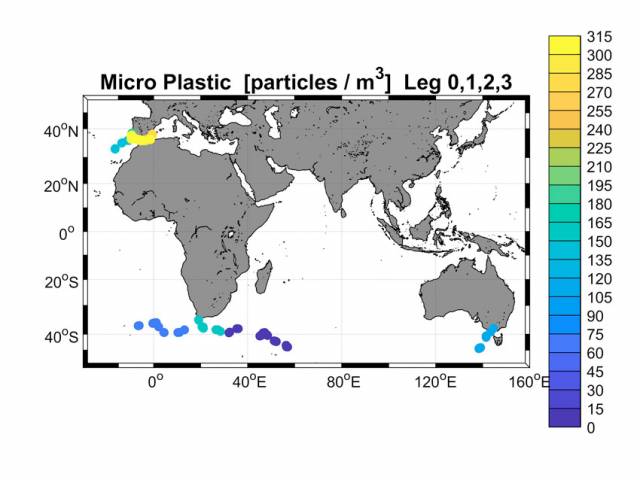#MarineScience - Microplastic particles have been found in the oceans close to Antarctica, data collected during the Volvo Ocean Race has revealed.
Scientists with the Volvo Ocean Race Science Programme, funded by Volvo Cars, analysed water samples gathered at points during Leg 2 of the yacht race between Lisbon and Cape Town and Leg 3 from Cape Town to Melbourne.
The results, announced at the Volvo Ocean Race Hong Kong Ocean Summit, found microplastics in the Southern Ocean close to the Antarctic Ice Exclusion Zone.
Compared to other oceans, the number of microplastic particles was small, but four microplastic particles per cubic metre were still found.
Over one million microplastic particles per square kilometre of ocean were found in the Southern Atlantic Ocean, west of Cape Town. And on the third leg of the race, one and a half million microplastic particles per square kilometre of ocean were discovered east of South Africa.
In Australian waters, close to Melbourne, one million microplastic particles per square kilometre of ocean were found.
The tiny particles of plastic, which break down from larger pieces such as single-use plastic bottles, were collected by race team Turn the Tide on Plastic, which features Ireland’s own Annalise Murphy in its crew rotation.
“This new information confirms the results we had previously collected from European waters and shows that there are consistently high levels of microplastic in the ocean and we are also seeing low levels of microplastics in waters close to the Antarctic,” said Sören Gutekunst, who works at GEOMAR, an ocean research institute in Kiel, Germany.
“The Turn the Tide on Plastic race team is collecting extremely valuable scientific data that will help us gain a clearer picture of the amount of microplastics in our oceans.”
Microplastic has the potential to enter the food chain, in species such as tuna and mackerel, and can cause harm to humans, too. It consists of small particles of plastic, often invisible to the naked eye and less than 5mm.
At the Hong Kong Ocean Summit, Daisy Lo, assistant director of environmental protection with the Hong Kong Special Administrative Region (HKSAR) government, pledged to explore ways to reduce plastic at source, revealed plans for a $HK20 million fund for upgrading plastic recycling facilities and talked of efforts to clean up the marine environment.
Anne-Cecile Turner, sustainability programme leader for the Volvo Ocean Race, said: “We know very little about exactly how much microplastic is contaminating our oceans so this data provides information for the scientific community and the wider public.
“Volvo Ocean Race Ocean Summits offer a platform to showcase innovative solutions to the global crisis of plastic polluting our oceans.”
The news comes as Volvo Ocean Race boat Team AkzoNobel has been announced as the second team to use the on-board data gathering equipment to measure water quality and composition, as well as microplastics in some of the world’s remotest oceans.
The scientific research was collected using a state-of-the-art instrument designed especially for the Volvo Ocean 65 racing yacht.
Volvo Cars is funding the Volvo Ocean Race Science Programme by donating €100 from the first 3,000 sales of the new V90 Cross Country Volvo Ocean Race edition vehicle.
Consisting of three key pillars – meteorological data collection, scientific drifter buoy deployment, and on board analysis of key metrics for ocean health including salinity, temperature, dissolved CO2 and Chlorophyll a – this marine science programme aims to create a snapshot of the health of the oceans to help scientists worldwide.
Last week, the Marine Institute in Galway declared its support for Ireland’s commitment to legislation prohibiting the sale of certain products containing microbeads, as previously reported on Afloat.ie.
































































